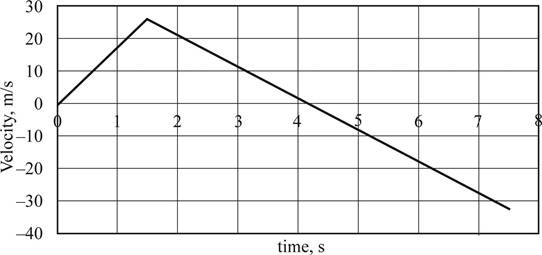
Concept explainers
(a)
The net force on rocket during the first
(a)
Answer to Problem 172P
Net force is
Explanation of Solution
Acceleration of rocket in first
Write the equation to find the net force on rocket.
Here, the net force is
Conclusion:
Substitute
The direction of
Therefore, the net force is
(b)
The force exerted by the burning fuel on the rocket.
(b)
Answer to Problem 172P
Exerted force is
Explanation of Solution
Acceleration of rocket in first
Write the equation to find the force exerted by the burning fuel on rocket.
Here, the force exerted by the burning fuel is
Conclusion:
Substitute
The direction of
Therefore, the exerted force is
(c)
The distance travelled by the rocket.
(c)
Answer to Problem 172P
Distance travelled is
Explanation of Solution
Acceleration of rocket in first
Write the equation to calculate the distance travelled by rocket during the burning time.
Here, the distance travelled by the rocket during the burning time is
Write the equation for the upward speed.
Here, the upward speed achieved by the rocket is
Write the equation to calculate the time taken to reduce the velocity from
Write the equation to calculate the distance travelled by rocket during the free fall period.
Here, the final speed of motion in free fall is
Write the equation for the total distance traveled by the rocket.
Here, the total distance travelled is
Conclusion:
Substitute
Substitute
Substitute
Substitute
Substitute
Therefore, the distance travelled is
(d)
The time taken by the rocket to return to the ground after liftoff.
(d)
Answer to Problem 172P
Time taken is
Explanation of Solution
Acceleration of rocket in first
Write the equation to find the time taken by the rocket to fall from rest from height
Here, the time taken by the rocket to fall from rest from height
Write the equation to find the time taken by the rocket to return to the ground after liftoff.
Here, the total time taken by the rocket to return to the ground after liftoff is
Conclusion:
Substitute
Substitute
Therefore, the time taken is
(e)
Plot the velocity –time relation of rocket for the entire travel from the launch to the return back to the ground.
(e)
Explanation of Solution
Acceleration of rocket in first
The velocity –time relation of rocket for the entire travel from the launch to the return back to the ground is shown below in figure 1.

In first
Therefore, the time taken is
(f)
The net force on rocket after the complete usage of fuel.
(f)
Answer to Problem 172P
The net force is
Explanation of Solution
Acceleration of rocket in first
After the fuel is completely used, the rocket is in free fall. At that moment, the net force on the rocket is its weight itself.
Write the expression for the weight of rocket.
Here, the net force is
Conclusion:
Substitute
Since weight is acting vertically downwards,
Therefore, the net force is
Want to see more full solutions like this?
Chapter 4 Solutions
Loose Leaf For Physics With Connect 2 Semester Access Card
 College PhysicsPhysicsISBN:9781305952300Author:Raymond A. Serway, Chris VuillePublisher:Cengage Learning
College PhysicsPhysicsISBN:9781305952300Author:Raymond A. Serway, Chris VuillePublisher:Cengage Learning University Physics (14th Edition)PhysicsISBN:9780133969290Author:Hugh D. Young, Roger A. FreedmanPublisher:PEARSON
University Physics (14th Edition)PhysicsISBN:9780133969290Author:Hugh D. Young, Roger A. FreedmanPublisher:PEARSON Introduction To Quantum MechanicsPhysicsISBN:9781107189638Author:Griffiths, David J., Schroeter, Darrell F.Publisher:Cambridge University Press
Introduction To Quantum MechanicsPhysicsISBN:9781107189638Author:Griffiths, David J., Schroeter, Darrell F.Publisher:Cambridge University Press Physics for Scientists and EngineersPhysicsISBN:9781337553278Author:Raymond A. Serway, John W. JewettPublisher:Cengage Learning
Physics for Scientists and EngineersPhysicsISBN:9781337553278Author:Raymond A. Serway, John W. JewettPublisher:Cengage Learning Lecture- Tutorials for Introductory AstronomyPhysicsISBN:9780321820464Author:Edward E. Prather, Tim P. Slater, Jeff P. Adams, Gina BrissendenPublisher:Addison-Wesley
Lecture- Tutorials for Introductory AstronomyPhysicsISBN:9780321820464Author:Edward E. Prather, Tim P. Slater, Jeff P. Adams, Gina BrissendenPublisher:Addison-Wesley College Physics: A Strategic Approach (4th Editio...PhysicsISBN:9780134609034Author:Randall D. Knight (Professor Emeritus), Brian Jones, Stuart FieldPublisher:PEARSON
College Physics: A Strategic Approach (4th Editio...PhysicsISBN:9780134609034Author:Randall D. Knight (Professor Emeritus), Brian Jones, Stuart FieldPublisher:PEARSON





